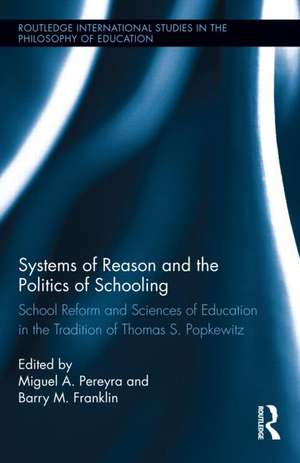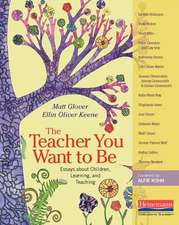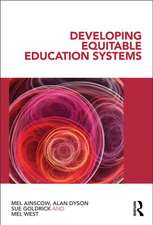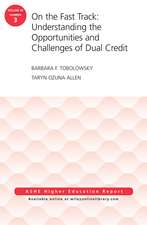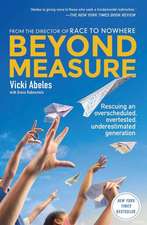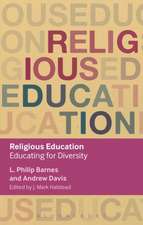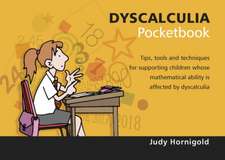Systems of Reason and the Politics of Schooling: School Reform and Sciences of Education in the Tradition of Thomas S. Popkewitz: Routledge International Studies in the Philosophy of Education
Editat de Miguel Pereyra, Barry Franklinen Limba Engleză Hardback – 25 apr 2014
Din seria Routledge International Studies in the Philosophy of Education
-
 Preț: 302.18 lei
Preț: 302.18 lei -
 Preț: 272.12 lei
Preț: 272.12 lei - 9%
 Preț: 934.96 lei
Preț: 934.96 lei - 8%
 Preț: 382.22 lei
Preț: 382.22 lei -
 Preț: 303.94 lei
Preț: 303.94 lei -
 Preț: 478.51 lei
Preț: 478.51 lei -
 Preț: 316.65 lei
Preț: 316.65 lei - 18%
 Preț: 1218.89 lei
Preț: 1218.89 lei - 18%
 Preț: 1160.32 lei
Preț: 1160.32 lei - 13%
 Preț: 350.29 lei
Preț: 350.29 lei - 18%
 Preț: 701.69 lei
Preț: 701.69 lei - 18%
 Preț: 1000.45 lei
Preț: 1000.45 lei -
 Preț: 476.60 lei
Preț: 476.60 lei -
 Preț: 478.16 lei
Preț: 478.16 lei -
 Preț: 248.44 lei
Preț: 248.44 lei -
 Preț: 455.78 lei
Preț: 455.78 lei -
 Preț: 447.57 lei
Preț: 447.57 lei -
 Preț: 370.35 lei
Preț: 370.35 lei - 18%
 Preț: 1052.35 lei
Preț: 1052.35 lei - 26%
 Preț: 708.55 lei
Preț: 708.55 lei - 18%
 Preț: 1000.27 lei
Preț: 1000.27 lei -
 Preț: 456.77 lei
Preț: 456.77 lei - 18%
 Preț: 1228.07 lei
Preț: 1228.07 lei -
 Preț: 450.45 lei
Preț: 450.45 lei -
 Preț: 453.89 lei
Preț: 453.89 lei -
 Preț: 479.47 lei
Preț: 479.47 lei -
 Preț: 427.99 lei
Preț: 427.99 lei -
 Preț: 376.10 lei
Preț: 376.10 lei - 18%
 Preț: 1164.75 lei
Preț: 1164.75 lei - 18%
 Preț: 1163.66 lei
Preț: 1163.66 lei - 18%
 Preț: 1160.47 lei
Preț: 1160.47 lei -
 Preț: 477.40 lei
Preț: 477.40 lei - 18%
 Preț: 1054.75 lei
Preț: 1054.75 lei - 18%
 Preț: 998.71 lei
Preț: 998.71 lei - 18%
 Preț: 1114.64 lei
Preț: 1114.64 lei -
 Preț: 455.78 lei
Preț: 455.78 lei - 13%
 Preț: 349.81 lei
Preț: 349.81 lei - 13%
 Preț: 349.34 lei
Preț: 349.34 lei - 18%
 Preț: 1062.98 lei
Preț: 1062.98 lei - 26%
 Preț: 764.20 lei
Preț: 764.20 lei
Preț: 938.52 lei
Preț vechi: 1257.81 lei
-25% Nou
Puncte Express: 1408
Preț estimativ în valută:
179.61€ • 186.82$ • 148.28£
179.61€ • 186.82$ • 148.28£
Carte tipărită la comandă
Livrare economică 14-28 aprilie
Preluare comenzi: 021 569.72.76
Specificații
ISBN-13: 9780415524162
ISBN-10: 0415524164
Pagini: 380
Ilustrații: 7
Dimensiuni: 152 x 229 x 23 mm
Greutate: 0.86 kg
Ediția:New.
Editura: Taylor & Francis
Colecția Routledge
Seria Routledge International Studies in the Philosophy of Education
Locul publicării:Oxford, United Kingdom
ISBN-10: 0415524164
Pagini: 380
Ilustrații: 7
Dimensiuni: 152 x 229 x 23 mm
Greutate: 0.86 kg
Ediția:New.
Editura: Taylor & Francis
Colecția Routledge
Seria Routledge International Studies in the Philosophy of Education
Locul publicării:Oxford, United Kingdom
Public țintă
Postgraduate and UndergraduateCuprins
1. Introduction: Reimagining Education Research Through the Work of Thomas S. Popkewitz Miguel A. Pereyra & Barry Franklin Part I: Thomas S. Popkewitz, the Scholar and his Scholarship 2. The Scholarship of Thomas S. Popkewitz (1970-2013) Antonio Luzón & Mónica Torres 3. The Meanings of a Scholarship – An Intellectual Interview with Tom Popkewitz Miguel A. Pereyra Part II: Honoring Thomas S. Popkewitz 4. Curriculum Codes and International Statistics Sverker Lindblad 5. Heterogeneous Gatherings, Translating Devices: A Reading of Tom Popkewitz’s Contributions to Curriculum Studies Inés Dussel 6. The Learning Question: Monitoring, Feedback, and Performance Spectacles Maarten Simons 7. Unhinging Modernity: Historiographical Periodization as effective History Lynn Fendler 8. Pedagogy Towards Diversity: A Cross-Cultural Approach to Historicizing the Present Wu Zongjie and Han Chunyan 9. Knowledge as Politics: Travelling with Tom Popkewitz António Nóvoa 10. On Community as a Governmental Technology – The Example of Teacher Education Ulf Olsson, Kenneth Petersson & John B. Krejsler 11. Surveillance and Normalization: Policies and Pedagogies of Japanese Language Education for Immigrant Children Jie Qi 12. Globalizing Perpetual Peace: Justice and Progress in the Fabrication of the Cosmopolitan Schoolchild Noah W. Sobe 13. The Unfinished Cosmopolitan as the Embodiment of the Paradoxes and Promises of Democratic Education Daniel S. Friedrich 14. Nationalizing Interculturalism: Reading Intercultural School Policy through Italian Cosmopolitanism Jamie A. Kowalczyk 15. Self-Reflection, or the Intellectual’s Virtues: The Culture-Epoch Theory as a System of Reasoning Daniel Tröhler 16. From Indigenous Foreigner to Aporetic Subject: Valuing Openness in Inquiry for Education Lynda Stone 17. Teaching as Courage of Truth: Pedagogy and Parrehsia Jorge Ramos do Ó & Julio Groppa Aquino
Descriere
The 1980s were an important decade for educational inquiry. It was the moment of the “linguistic turn,” with its emphasis on the role of language as a constructor of reality, a structuring agent for institutions such as schools, and a medium for translating knowledge into elements of power for processes of social regulation. Drawing on the work and insights of educational researcher Thomas S. Popkewitz, this book shows how the linguistic turn provided an alternative to both mainline educational research grounded in the ideals of political liberalism and the effort of neo-Marxists to challenge liberal thinking in favor of a scholarship based on class conflict and economic determinism.
